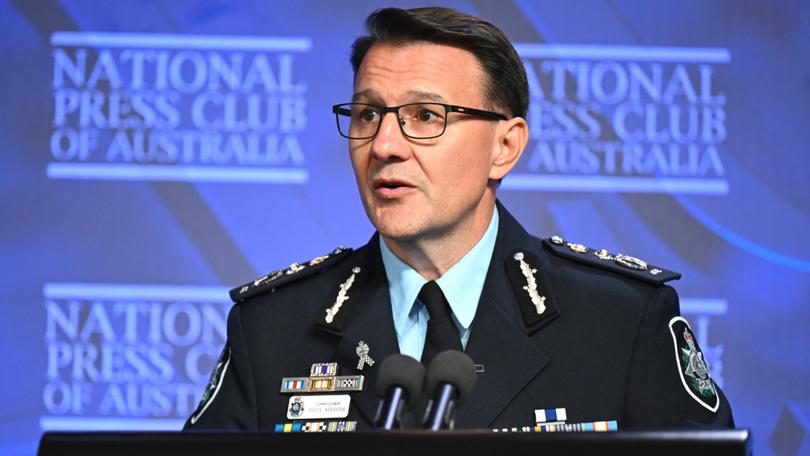AFP Commissioner Reece Kershaw says 60 per cent of youth terror suspects charged with offences since July 2021
More than half of young people investigated by counter-terrorism police in the last three years have been charged with offences including building explosives and advocating or preparing for a terror attack.

More than half of young people investigated by federal counter-terrorism police in the last three years have been charged with offences including building explosives and advocating or preparing for a terror attack.
The alarming statistics emerged in Budget Estimates on Friday evening from Australian Federal Police Commissioner Reece Kershaw.
Since July 2021, the AFP and its Joint Counter Terrorism Team partners have investigated 27 youths aged 17 or younger — the youngest being 12-years-old.
Sign up to The Nightly's newsletters.
Get the first look at the digital newspaper, curated daily stories and breaking headlines delivered to your inbox.
By continuing you agree to our Terms and Privacy Policy.More than 60 per cent of those — or at least 15 teens — have been charged with Commonwealth or State-based offences as a result.
Among the offences are teenagers accused of advocating for terrorism, possessing or distributing extremist material, being members of a terrorist organisation — even actively preparing for a terror offence or possessing, supplying or making explosives.
Mr Kershaw said those investigations were among a “number of challenging threats” drawing on AFP resources.
“These threats have the potential to impact on our social cohesion, the safety of our youth and our democracy, but we are confident that our operational strategies and dedicated members can continue to protect Australians and Australia’s interests,” he said.
The commissioner also said the AFP’s high caseload “reflects a highly-concerning trend of youth being radicalised online by other individuals they are engaging with, or through self-radicalisation”.
“We are concerned about the activity identified online, as well as what is happening in the real world, including violence in schools, such as planning possible attacks on students and teachers, and the production of explosives or possession or use of weapons,” Mr Kershaw said.
“When possible, and where there is no immediate threat to the community, the AFP prioritises early intervention and disruption strategies ahead of prosecuting young people.”
But the Federal Government’s Countering Violent Extremism initiatives face funding uncertainty beyond 2024-25 after Budget papers revealed there was no funding allocated to the programs — one of which targets young people and adults at risk of radicalisation — beyond the 2024-25 financial year.
It comes just weeks after a 16-year-old boy, who police say had been radicalised online, was fatally shot by officers in a Bunnings carpark in Willetton on May 4 after he had stabbed a man and lunged at police officers with a knife.
Following the incident it was revealed the teen had been known to police for two years after being identified as at-risk of radicalisation, and subsequently enrolled in a deradicalisation program.
Another alleged terror plot by a teenager saw Bishop Mar Mari Emmanuel of the Christ The Good Shepherd Church stabbed in Sydney on April 15. Six teens aged between 14 and 17 are now facing terror offences.
“It is in everyone’s interests, including the AFP’s interests, that early intervention is prioritised,” Mr Kershaw said.
